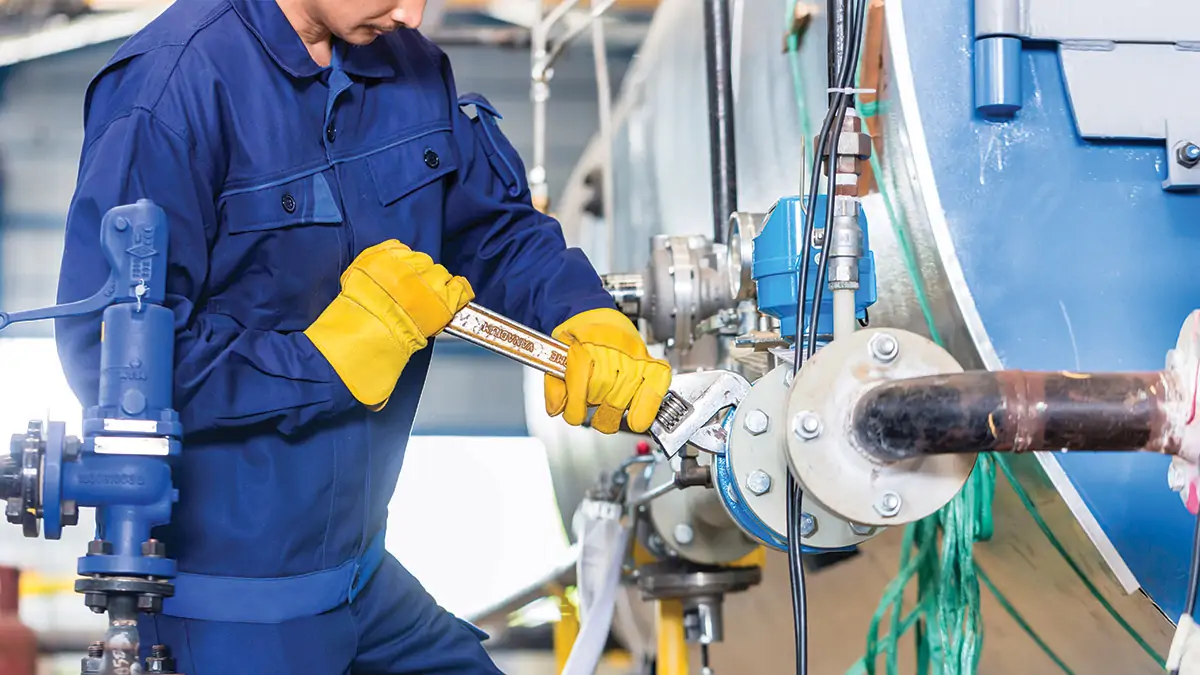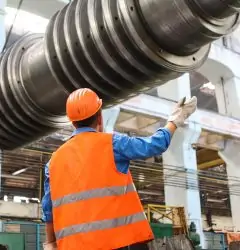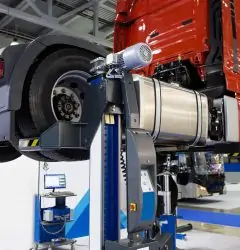29 Jun

Industrial maintenance can also be referred to as plant maintenance. It is a process that helps to maintain and maximized equipment uptime while they are in a manufacturing environment. By ensuring that the equipment is working just fine, manufacturers can easily avoid any sort of roadblocks and unnecessary interruptions in the supply chain’s production phase.
Meeting production quotas at a justifiable cost without having to implement industrial maintenance appears to be virtually impossible. Depending on contractors for repairing equipment that is crucial for everyday operations reactively, in terms of unplanned downtime and costs of labor, it is indeed expensive. That is why hiring a team that will be responsible for industrial maintenance is extremely crucial to run an efficient plant.
What Are The Types of Maintenance?
Corrective Maintenance
As the name explains, corrective maintenance is performed right after the problem occurs and is reported. Corrective maintenance is applied to fix a piece of equipment and bring it to its operational condition again. It can be both unplanned and planned, depending on whether or not you have an already developed maintenance plan to deal with maintenance tasks. When a problem cannot be predicted with preventive maintenance, you need to rely on unplanned corrective maintenance.
Predetermined Maintenance
It is not the most popular type of maintenance as it depends on the programs that manufacturers deliver. To be better said, predetermined maintenance is performed in congruence with the programs that are described by manufacturers. The maintenance department only has to follow the program designed by the manufacturer. Because of that, there is a risk of increased downtime affecting the production and other important operations.
Condition-based Maintenance
This is known to be the most complex form of maintenance in terms of implementation. Condition-based maintenance involves routine checkups and a proper plan that prevents any system failures from occurring. It is responsible for monitoring the equipment’s actual state and decides what type of maintenance is required depending on some indicators: upcoming failures, performance, etc.
Predictive Maintenance
Predictive maintenance is responsible for monitoring the performance and condition of the equipment that is being used during an operation. One of the major reasons for performing predictive maintenance is to minimize the risk of failures. The predictive maintenance principles have been in use since the ’90s. Predictive maintenance software is integrated with sensors to monitor the condition of in-service equipment to estimate when maintenance should be performed.
Preventive Maintenance
This type of maintenance helps to identify the equipment failures or breakdowns before they even occur. Preventive measures are added in the maintenance plan by manufacturers to minimize the chances of unplanned breakdowns and equipment failures. For implementing a successful preventive maintenance program, a strategic approach is required. Having a well-developed preventive maintenance (PM) program is essential for every industry to ensure that the equipment is reliable for use in production operations. Preventive maintenance software and can help you save time and money by automating workflows.
Which Type of Maintenance Is Most Expensive?
Maintenance requires a good share of the total costs of operation for various industries. In some scenarios, maintenance costs around half of the total production costs. Unplanned failures and breakdowns usually lead to additional costs.
To be precise, a company’s profitability relies on how efficiently the team responsible for maintenance, develops, and implements maintenance programs. Therefore, implementing a well-developed maintenance plan is essential for ensuring equipment reliability and minimize the costs of production.
Every facility or plant has its specific requirements and needs. Hence, to cater to these maintenance requirements and to keep the equipment in operational condition, it is crucial to have a maintenance program with various types of maintenance involved to be prepared for all types of maintenance calls.
What Are Some Common Industrial Maintenance Jobs?
Upon googling for industrial maintenance jobs, you will find a good range of offers for different positions. But you should always check for the requirements as many of them have similar job roles just with different job titles.
These positions require individuals who are expert with their hands and can follow safety procedures ad instructions. Along with that, they must be able to work overtime occasionally. Nowadays, many job positions also require skills like basic computer skills, as businesses today prefer to use software solutions like CMMS.
Here are some common industrial maintenance jobs:
Industrial Maintenance Technician
An industrial maintenance technician’s role is to repair and maintain industrial machinery.
These technicians can have the following responsibilities:
- Ensuring the machinery and mechanical equipment is in operation condition by catering to both planned and unplanned maintenance requirements.
- Implementing preventative maintenance on all facility equipment.
- Completion of work orders while ensuring high-quality standards within the given deadlines.
- Availablity at times of emergencies such as when there is an unplanned breakdown or failure.
- Reading, understanding, and analyzing all technical procedures, service manuals, electrical schematics, word order, etc. for performing requirement services and maintenance.
- Troubleshooting mechanical breakdowns.
Industrial Maintenance Mechanic
These mechanics are responsible for the installation, repairs, and maintenance of all industrial equipment. This job position is similar to the job role of a maintenance technician.
Some common duties of industrial maintenance mechanic include:
- Conduction preventative maintenance on every equipment.
- Performing electrical and mechanical troubleshooting and repairs.
- Taking care of pneumatic and hydraulic troubleshooting and repairs.
- Installing all new equipment.
- Metal fabrication and welding of all equipment parts that require repairs.
- Disassembling machines and adjusting machine parts in control instruments.
Industrial electrician
These individuals are responsible for overseeing the repair, maintenance, and installation of an electrical system in an industrial setting. Their job roles are quite similar to the roles of industrial mechanics and industrial technicians. But the most common difference between these two and industrial electrician is that these guys focus on electrical systems mostly.
Their duties involve:
- Installation of a new electrical system.
- Update, verify, and maintain electrical schematics.
- Troubleshoot problems that occur with electrical equipment.
- Repairing and maintaining the existing equipment.
Maintenance Managers
These people are responsible for maintenance operations and managing people. Maintenance managers work according to the size of the maintenance department.
Their job can be divided into three positions; maintenance managers, maintenance supervisors, and maintenance planners.
In smaller companies, a maintenance manager will be responsible for doing the duties of all of these three positions.
Maintenance managers will be responsible for:
- Coordinating with the maintenance team and scheduling all maintenance tasks.
- Ensuring that all maintenance tasks are performed confirming to policies of the company and OSHA guidelines.
- Ensuring that all industry regulations are being followed.
- Managing the maintenance budget.
- Manage to forecast, place orders, and negotiate on pricing for equipment parts inventory.
- Development and implementation of an efficient maintenance program.
- Hiring people (subcontractors) for specific maintenance tasks.
- Always looking for new assets, tools, and ways to enhance productivity and minimize costs.
Industrial Maintenance Certifications And Training
One recognized certification, which is specific to industrial maintenance, and it was offered once by the International Society of Automation (ISA) and those who received certificates were recognized as Certified Industrial Maintenance Mechanics (CIMMs).
This certification was later transferred to the Society for Maintenance and Reliability Professionals (SMRP), and those who received certificates are now recognized as Certified Maintenance and Reliability Technicians. (CMRTs).
Along with getting relevant certifications through Society for Maintenance and Reliability Professionals (SMRP), these industrial maintenance professionals are enabled to enroll at different schools offering industrial maintenance training. Offering such type of training to employees can be essential for retaining exceptional talent.
Industrial Maintenance Training – How Intensive It Is?
While it is true that it varies from one industry to another, industrial facilities serve as a home for various industrial assets. It is the major reason why an industrial maintenance worker must have a good range of skills, including almost everything from welding, hydraulics, electricity, to precision machining.
Of course, no one expects them to be an expert with every asset. A large industrial facility usually has some assets that require specific repairs, and these repairs are performed by contractors hired from outside of the company. Such contractors usually go around the country to repair certain assets. These asset repairs are very expensive, and contractors charge a lot for performing these maintenances and repairs. Hence businesses have to send their workers to get trained and learn to perform such repairs so that they can minimize the costs and unplanned downtime.
All technicians and mechanics must go through a type of apprenticeship program, and these are not that hard to find because industrial maintenance jobs are continuously in demand.
Apprenticeship programs are important because they enable trainees to get familiar with assets and industry where they desire to work and provide exceptional practical experience.
Managerial or superior positions such as a position of a maintenance manager are reserved for individuals who have some years of experience working in an industry and have managed a good range of responsibilities.
What Industries Are More Dependent on Industrial Maintenance?
As we explained, industrial maintenance is a process of performing maintenance on industrial equipment. This term s very broad and includes all things from air tools, ball bearings, valves, compressors, cement mixers, to bulldozers.
According to the definition, industrial maintenance can be found everywhere. However, some industries that heavily rely on industrial maintenance are:
- Manufacturing Industry.
- Energy Industry (electric power, mining, gas, oil industry).
- Aviation Industry.
- Construction Industry.
These industries have two things in common:
- They all have heavy equipment that has big capital expenditures.
- They have maintenance costs that represent a huge share of their total operational cost.
To be precise, these industries spend a lot of money on the maintenance of assets.
Let’s have a deeper look:
- Food Processors – Here, maintenance is performed on industrial-sized spiral ovens, steam cookers, fryers, food conveyors, and other heavy equipment used for food processing.
- Refineries – Here, maintenance is performed on furnaces, boilers, heat exchangers, tanks, and reactors. Work is also required for welded, flanged, and screwed tubing and piping.
- Printing Presses – Maintenance is performed on flatbed screen printing units, cold stamping units, laminating units, rotary presses, and flatbed embossing units.
- Paint Suppliers – Maintenance is performed on mills, mixers, filling line equipment, oxidizers, thermos, chillers, dryers, tanks, wrappers, tank tippers, tank washers, pumps, motors, and conveyors.
Practices For Improving Industrial Maintenance
Industrial maintenance deals with a wide range of moving parts, both figuratively and literally. Here are some tips you should focus on if you are eager to maximize industrial maintenance positive effects:
Running A Well-Developed Maintenance Program
Talking about effective maintenance is irrelevant if your maintenance activities mostly revolve around fixing and repairing equipment and assets that are already broken.
It is a must to adopt a proactive approach for maintenance. The right place to start is choosing one or more than one of these maintenance strategies:
- Preventive Maintenance Strategy
- Condition-based maintenance (CBM)
- Predictive Maintenance (PdM)
It is important, to begin with, a maintenance strategy as all of your maintenance operations rely on the strategy that you adopt for maintenance and the software you use for maintenance.
Using A Mobile Maintenance Software
It is nearly impossible to manage a proactive maintenance department without having the support of mobile maintenance software. Having a CMMS enables you to:
- Schedule and track all maintenance tasks remotely.
- Have good control over your inventory of spare parts.
- Maintain all crucial information about your assets in one place where you easily access it all the time.
- Generate reports that you can use to make improvements and minimize costs.
And so much more.
Knowing What To Do And How To Do It
To have a well-developed and effective industrial maintenance program, the maintenance team must know what to do and how to do it, i.e., they must know the procedure of performing a maintenance task.
For ensuring that all of your team members have a clear understanding of everything, it is essential to develop clear:
- Standard operating procedures (SOPs)
- Emergency operating procedures (EOPs)
- Preventive maintenance checklists
- OSHA guidelines
Always remember that, along with these procedures, proper industrial maintenance and training play a huge role in developing an effective maintenance program.
Set, Measure, Improve
Feeling that things are getting better and knowing that they are actually improving are two different things. Setting goals to achieve is the only way to ensure that things are continuously improving.
For fine-tuning your industrial maintenance tasks, it is essential to define all your maintenance KPIs, using CMMS for tracking metrics and generating reports, and making amendments if numbers tell that you have a chance of failing to achieve your maintenance goals.
Benefits of Industrial Maintenance Management Software
Using industrial maintenance management software allows for:
- Planning and scheduling preventative maintenance.
- Efficiently managing work orders.
- Managing inventory of spare parts.
- Elimination of paperwork.
- Enhancing productivity.
- Reducing repair costs and downtime.
- Maximizing safety.
- Overseeing your organization’s overall productions and performance.
- Ensuring that your organization is following the regulatory standards.
- Reducing overtime.




Ecodocs